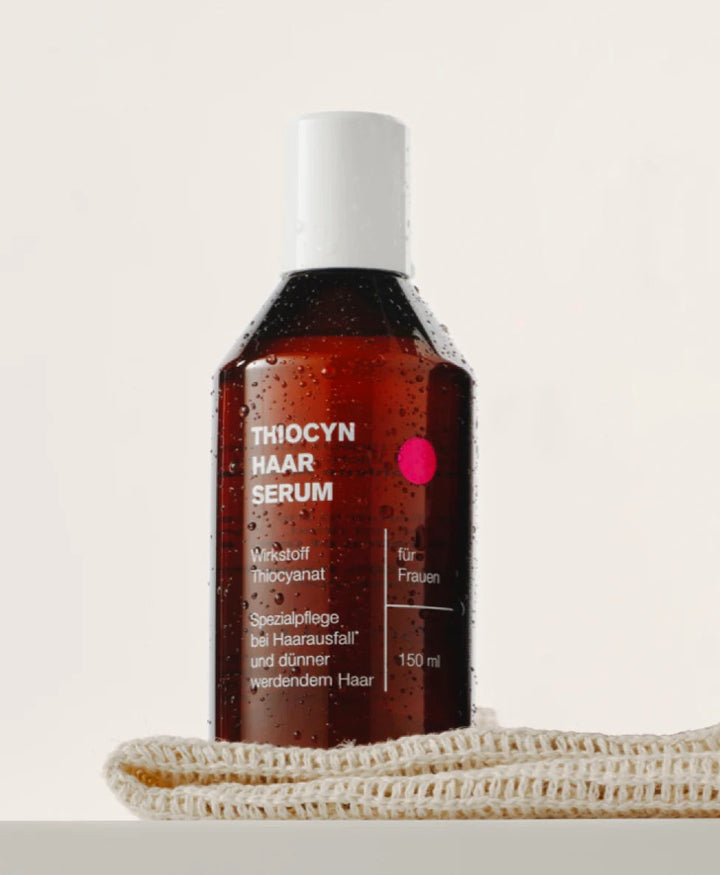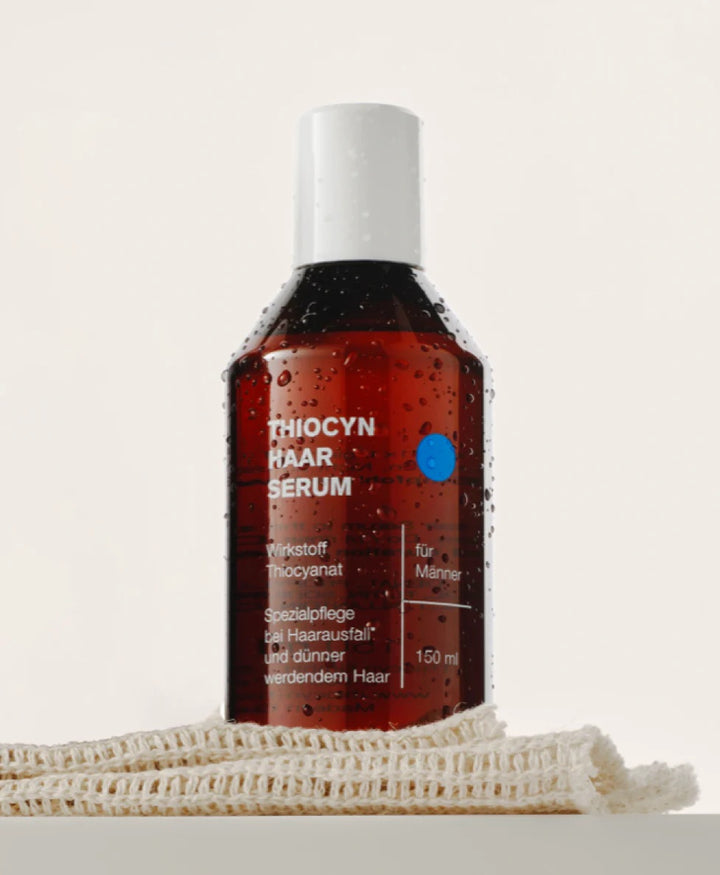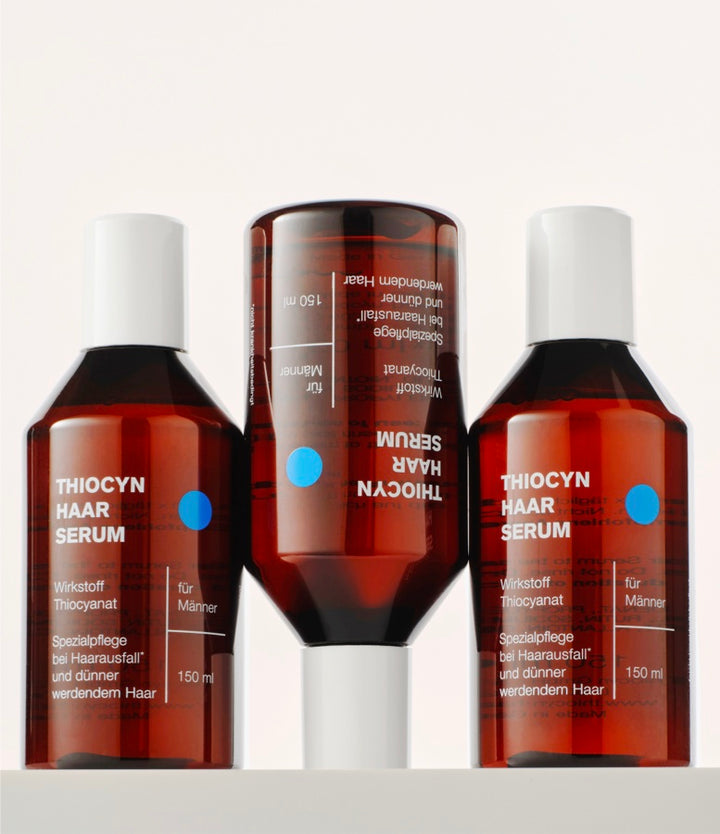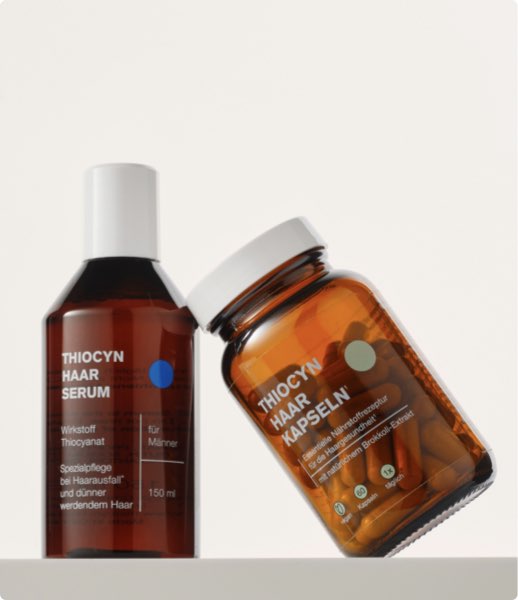| 04. July 2023
Fighting hair loss* but how?

- If you want to reduce hair loss*, you need to normalize the hair cycle.
- A good remedy for hair loss* stabilizes the cell metabolism in the scalp and hair roots.
- Basically, counteracting hair loss and preventing hair loss means extending the hair growth phase.
During our childhood, we had no doubts: hair grows, and grows forever. Over the course of life, this certainty changes. Our hair reacts sensitively to a variety of disruptive factors. Men mostly deal with hereditary hair loss. Women primarily suffer from diffuse hair loss due to hormonal imbalances after pregnancy or during menopause, as well as various deficiencies, such as iron deficiency. Anyone who wants to normalize hair loss* needs to understand what happens at the hair root.
Understanding hair loss
To neutralize hair loss*, it is important to understand hair loss. Hair growth and hair loss are subject to the laws of Hair cycle. A hair cycle lasts three to six years in men and up to eight years in women. Then the hair falls out. The evolutionary reason: Our hair is exposed to many external factors for years: light, temperature fluctuations, humidity and dryness, and not least mechanical and chemical stimuli that occur when washing or styling. Hair ages, wears out, and is eventually replaced by new hair.
Individually different hair growth
During the growth phase (anagen), the hair is firmly anchored in the hair root. Hair grows through cell division in the hair matrix zone. By the time they reach the scalp, the soft, living hair cells formed in the matrix have transformed into keratinized cells and become visible as hair. With healthy cell metabolism, hair grows every day. 0.1 to 0.5 mm, a good 1 cm per month, around 10 cm per year. In children and teenagers, hair growth can reach up to 15 cm per year.
Planned hair loss
Our hair follicles are genetically programmed to shed old hair at the end of the growth phase. Hair loss begins in the two-week transition phase (catagen) with the breakdown of blood vessels, i.e., an interruption of the nutrient supply, and the regression of the hair bulb. After a resting phase (telogen), which lasts a good three months, the hair follicle slowly grows a new hair. Usually, a single stroke of the brush or a touch while washing your hair is enough to detach the loosely attached, old hair from the scalp. This is natural hair loss. If hair falls out prematurely, it is a hair problem.
Causes of excessive hair loss
In addition to hereditary hair loss in men and women, or diffuse hair loss due to illnesses such as thyroid disorders, medications and their side effects can also cause excessive hair loss. Dermatologists identify medications such as:
- Beta-blockers (blood pressure lowering drugs)
- Lipid-lowering agents (agents for reducing blood fat)
- some anticoagulants (except aspirin)
- Antibiotics and antidepressants,
- not least anti-pain and anti-rheumatic drugs.
In women, the high-progestin contraceptive pill is often responsible for excessive hair loss. Your doctor will determine which other medications could be responsible for hair loss.
Learn more about the causes of hair loss…
Stabilize cell metabolism
The causes of hair loss are diverse. You can try to address each of these causes individually. Another option would be to Cell metabolism to protect the entire body from growth-disrupting influences. Stabilizing cell metabolism increases the likelihood that hair will not fall out but continue to grow, regardless of the type of disorder.
The active ingredient that helps the cell metabolism at the hair root to work in peace is called ThiocyanateThiocyanate activates and regulates the body's own processes, promotes cellular activity throughout the organism, and supports the transport of endogenous molecules. Thiocyanate maintains cellular metabolism in balance. A patented thiocyanate active formula is found in Thiocyn Hair Serum and supports hair growth in women and men.
Hair loss in women
The most common type of hair loss in women is diffuse hair loss. Causes are often deficiencies, for example Iron deficiency due to insufficient iron intake through food or increased blood loss due to heavy menstrual bleeding. A balanced diet and ferritin, a protein complex that serves as a storage substance for iron, then lead to normal hair growth quite quickly.
Hair loss during menopause
A more difficult issue for many women is the lack of estrogen. When the cell metabolism suddenly lacks the natural hair growth agent estrogen during menopause, it is questionable whether diffuse hair loss can be explained by a Hormone therapy can be balanced. After all, estrogen receptors are gradually broken down after menopause. Hormone therapy would be ineffective.
Wouldn't it make more sense to strengthen cellular metabolism at the hair roots with an active ingredient that doesn't interfere with hormonally controlled metabolic processes? The thiocyanate active formula in Thiocyn Hair Serum offers excellent prospects, especially since, in addition to diffuse hair loss due to estrogen deficiency, androgenetic hair loss can also occur as a result of a relative androgen excess. The thiocyanate active formula doesn't combat the causes of hair loss*, but rather optimizes cellular metabolism.
Hair loss in men
Many men have to live with the diagnosis of hereditary hair loss at a young age. A close look reveals many downy hairs instead of strong terminal hairs. Why does hair density decrease particularly on the forehead (receding hairline) and on the back of the head (tonsure)? The explanation: Hair follicles in these areas of the head are very sensitive to the DHT androgen, a derivative of the male sex hormone testosterone. The hair follicles miniaturize, and with it the hair they produce. Only the hair above the ears and on the lower back of the head are resistant to the DHT androgen – and are therefore preferred for Hair transplants used.
Active ingredients that combat hair loss
Since the course of androgenetic alopecia in men cannot be influenced by lifestyle changes or optimized nutrition – for example, a protein-rich diet – affected men rely on thiocyanate because, as a natural molecule produced by the body, it promotes physiologically healthy cell metabolism in the scalp and at the hair root.The thiocynanate active formula contained in Thiocyn hair serum can best develop its optimal effect if it is used regularly over a longer period of time 1 x daily In young men with a family history of androgenetic alopecia, the prophylactic use of Thiocyn Hair Serum is even recommended as a means of reducing hair loss*.
Read by 23,000 people
Do it like 23,000 others and find out how you can improve your hair health - with great offers and discounts as well as helpful advice











